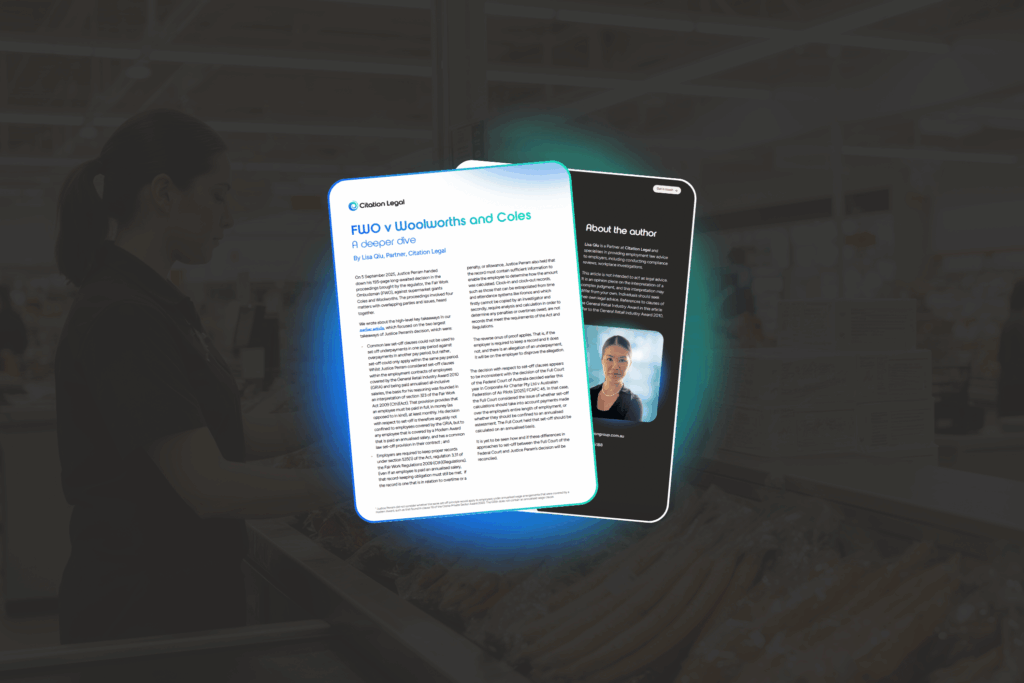
A recent decision by the Fair Work Commission (FWC) has clarified a key limitation for employees when it comes to the operation of the anti-bullying protections under the Fair Work Act 2009. That is, anti-bullying protections only apply to current workers and don’t extend to former employees.
This case involved a worker who sought anti-bullying orders shortly after his employment ended, raising questions about the scope of bullying protections and how dismissal interacts with anti-bullying claims.
In this article, our experts explain what happened, the Court’s findings, and the critical lessons employers should take away from this case.
What happened?
The worker, a casual draftsman employed by Prominent Fluid Controls Pty Ltd for nearly a decade, returned to work after parental leave, continuing a reduced two-day-per-week schedule to balance family responsibilities.
Upon his return, workplace tensions emerged when management requested that he increase his work commitment to four days per week due to a rising workload.
Key events:
- 16 July 2024: the engineering manager requested that the worker consider increasing his hours.
- 17 July 2024: after the worker declined, citing childcare responsibilities, the manager responded, “If you are unable to commit to 4 days per week, it would be better for you to finish up.“
The worker left the workplace that day and didn’t return. His access to company systems was revoked, and his final pay was processed on 24 July 2024.
The FWC’s findings: was it resignation or dismissal?
The employer argued that the worker resigned voluntarily, but the FWC found otherwise, concluding:
- The manager’s statement was both intended and likely to bring the employment to an end.
- The worker’s response was acceptance of the termination, not a resignation.
- Therefore, the worker had been dismissed at the employer’s initiative.
Importantly, at the time the worker made his anti-bullying application on 29 July 2024, he was no longer employed, making him ineligible to seek anti-bullying orders under the FW Act.
Key legal principle: anti-bullying orders apply only to current employees
Under section 789FC of the FW Act, a person must be:
- A current worker.
- Facing bullying at work to be eligible to apply for orders to stop bullying.
Because the worker’s employment had already ended by the time he applied, the FWC dismissed his stop order bullying application.
Four key lessons for employers
- Understand eligibility requirements
Anti-bullying protections under the FW Act only apply while a person is employed. Once employment ends, other legal avenues (such as unfair dismissal or general protections claims) may apply instead. - Manage return-to-work carefully
Requests to change work arrangements following parental leave must be handled sensitively and lawfully. Pushing workers to accept significant changes without genuine consultation can lead to claims of constructive dismissal or discrimination. - Be clear in termination communications
When ending employment, clarity is critical. Ambiguous conversations can lead to disputes over whether an employee resigned or was dismissed. - Maintain procedural fairness
In situations involving potential dismissal, ensure clear records, fair processes, and consistent management behaviour to withstand legal scrutiny.
This case highlights an important distinction under Australian workplace law: anti-bullying orders protect current workers, not former employees.
For businesses, it serves as a timely reminder to handle workplace disputes and employment changes with care, ensuring both procedural fairness and compliance with workers’ rights under the FW Act.
Understanding the limits of anti-bullying protections can help organisations avoid costly disputes and maintain safer, fairer workplaces.
Luckily, where there’s a workplace bullying problem, there’s a solution.
Addressing bullying and ensuring procedural fairness doesn’t have to be daunting. With the right guidance and resources, your business can confidently manage these situations, reduce risks, and promote a workplace that is not only safer but also more inclusive and fairer for everyone. And that’s where Citation HR can help.
Citation HR helps tens of thousands of businesses and has a go-to suite of both quantitative and qualitative well-being measures – essentially, antidotes for bullying.
Perhaps more importantly, our HR experts can guide you through the correct response when instigating, receiving, or investigating bullying accusations.
Need something a bit stronger for your workplace dispute? Mediation might be the answer.
Mediation can also be an effective solution for resolving interpersonal conflicts. Learn more about how we can help here.
If any of this information has raised questions about workplace bullying for your business or you’ve got another workplace compliance matter you need assistance with, please reach out to our experts via our 24/7 HR Advice Line.
Not a Citation HR client? To learn more about how Citation HR can help streamline your people management and take your business to the next level, reach out to our friendly team for a confidential, no-obligation chat.
About our author
Jack Bowkett is a Workplace Health and Safety Consultant at Citation Group. He has an interest in all things safety-related and regularly provides pragmatic advice on how businesses can comply with their WHS obligations and create a good working environment.









